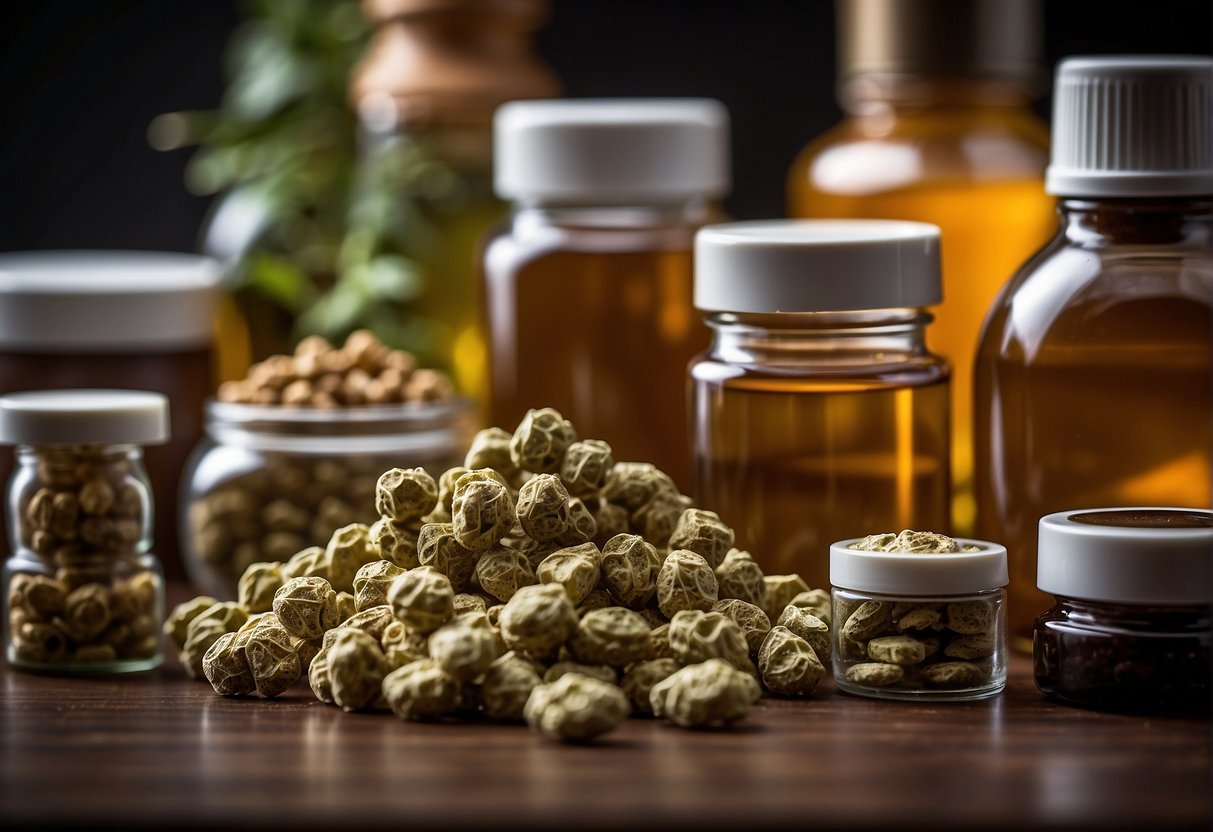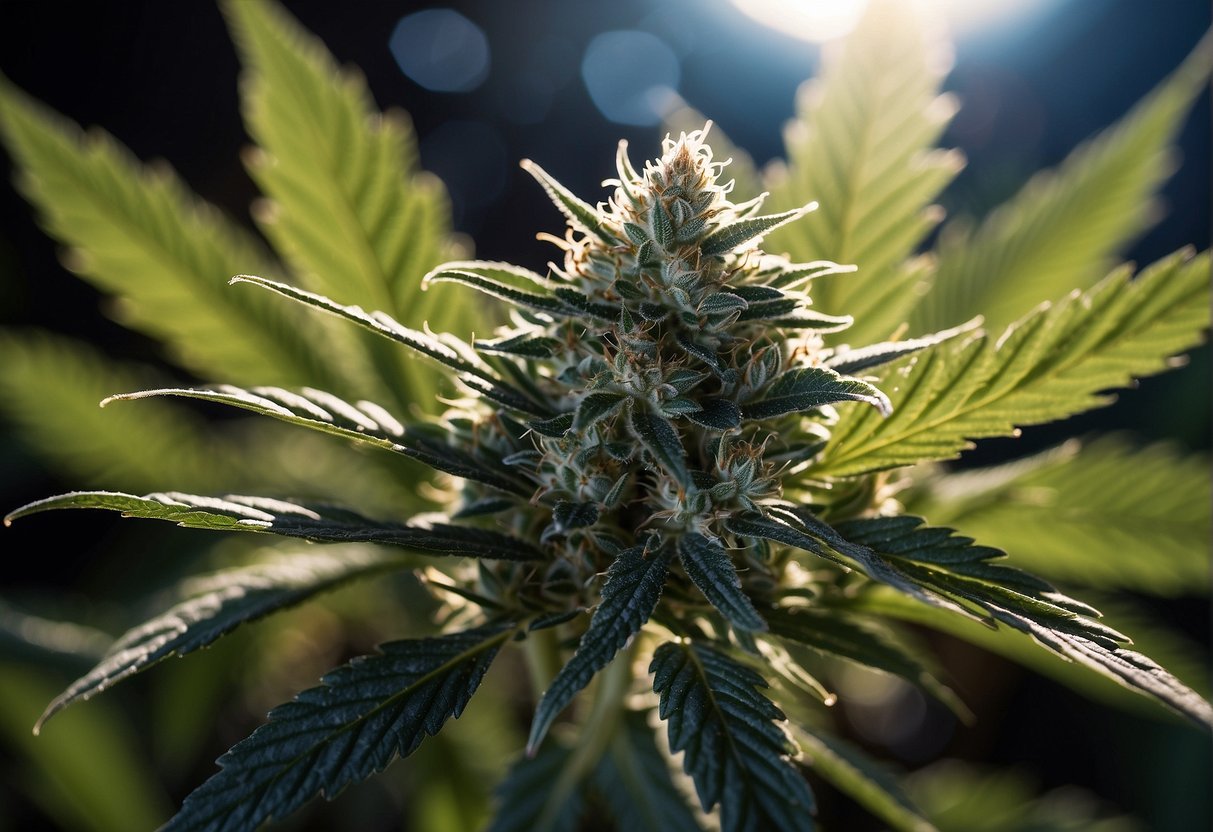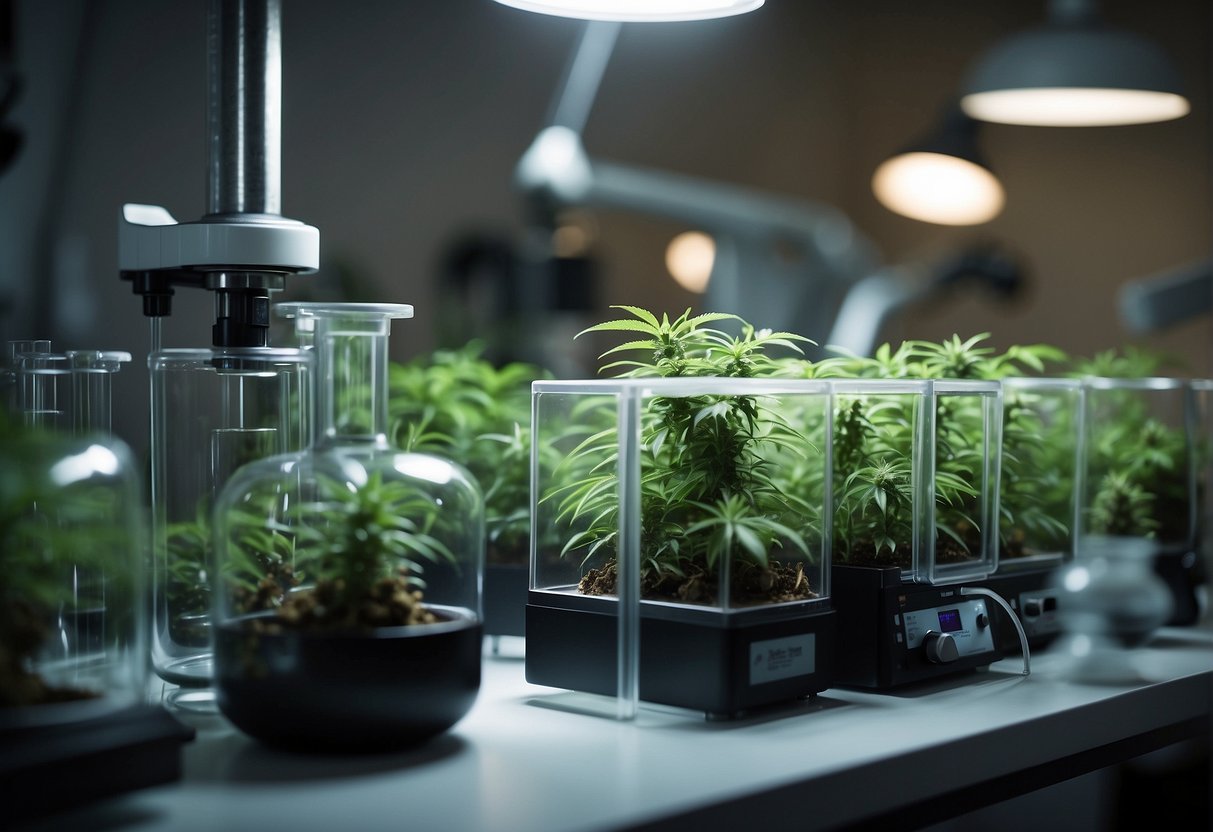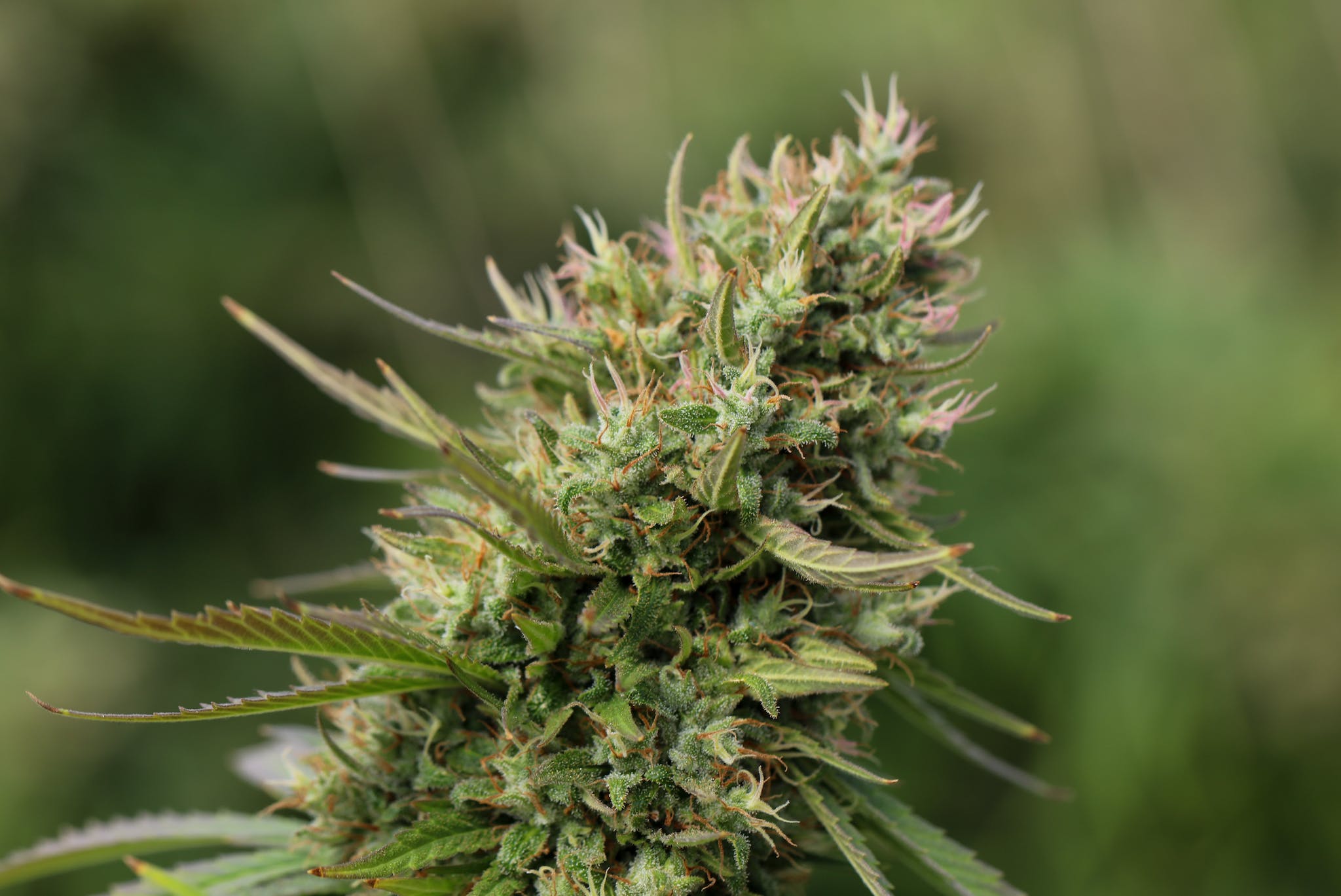THCa Benefits: Exploring the Therapeutic Potential of Cannabis Precursors
Cannabis science is like a magic box full of goodies for our wellbeing. Everyone’s looking at a shining star ingredient called tetrahydrocannabinolic acid, or in simple terms, THCa. This powerhouse hiding in the lively leaves of cannabis turns into the buzz-giving THC, but without sending you flying among the stars. Hard to believe, right? THCa loads your system with benefits while keeping your mind as clear as a sunny day, making it the dream pick for folks wanting to explore cannabis’s body perks without the high. Ready for a health journey without the fog? Taking a closer look at THCa benefits might be the perfect adventure you’re after.
- Understanding THCa and Its Properties
- Medical Benefits of THCa
- Different Forms of THCa Consumption
- Non-Psychoactive Nature of THCa
- THCa in the Endocannabinoid System
- Considerations for THCa Use
- Quality and Safety of THCa Products
- Frequently Asked Questions
- What are the neurological effects of THCa consumption?
- Can you quantitate the potency of THCa compared to other cannabinoids?
- What are the principal reasons behind THCa’s popularity?
- What methods of THCa ingestion are considered most effective?
- Are there any well-known therapeutic benefits associated with THCa?
- Does THCa intake present any significant side effects?
Your understanding of cannabis expands as you explore the non-psychoactive components like THCa. Research into this particular cannabinoid has suggested benefits that may be particularly helpful for conditions such as migraines, pain, and inflammation. This natural compound found in the trichomes of raw cannabis appears to hold promise for a variety of therapeutic applications.
As you delve into the potential health benefits of THCa, it’s important to distinguish between the anecdotal evidence and the scientific studies supporting its use. Although research is still in its early stages, preliminary findings indicate that THCa could be beneficial in a medical context. It has been identified as having anti-inflammatory, neuroprotective, anti-proliferative, and antiemetic properties, positioning this cannabinoid as a potentially powerful ally for your health.
Understanding THCa and Its Properties
Before diving into the minutiae of Tetrahydrocannabinolic Acid (THCa), it’s crucial to grasp that it is not psychoactive as its counterpart THC. Understanding its role as a precursor to THC, the decarboxylation process, and its chemical stability is essential.
THCa as a Precursor to THC
THCa stands for Tetrahydrocannabinolic Acid, a non-psychoactive compound found in raw and live cannabis. As the precursor to THC, the more familiar psychoactive component, THCa must undergo transformation to elicit the well-known effects of cannabis. This transformation is known as decarboxylation, a process activated by heat.
Decarboxylation Process
The decarboxylation process is a critical chemical reaction triggered by heat. It involves the removal of a carboxylic acid group from the THCa molecule, which converts it into psychoactive THC. This is why raw cannabis doesn’t produce the ‘high’ associated with THC; decarboxylation has not yet occurred.
- Heat Source: The catalyst for decarboxylation. It could be from drying, curing, or smoking cannabis.
- Chemical Reaction: A carboxylic acid group is removed from THCa, converting it to THC.
Chemical Structure and Stability
The chemical structure of THCa is characterized by a carboxylic acid group attached to the molecule. This structure makes THCa a stable compound, which is less volatile than THC. Over time or when exposed to excessive heat or UV light, THCa slowly decarboxylates into THC, altering both its properties and effects.
- Stability: THCa is more stable than THC due to its chemical structure.
- Volatility: THC is more volatile and will degrade faster than THCa under similar conditions.
Medical Benefits of THCa
Tetrahydrocannabinolic acid (THCa) is a non-psychoactive cannabinoid found in raw and live cannabis. As the precursor to THC, it’s abundant in fresh cannabis plants. Research has shown that THCa may have a range of medical benefits, including neuroprotective and anti-inflammatory properties, as well as the potential to relieve pain and possibly aid in cancer treatment.
Neuroprotective Effects
THCa has demonstrated neuroprotective effects which may prove beneficial in the treatment of neurodegenerative diseases. Studies suggest it could help in safeguarding brain cells against damage, degeneration, and inflammation.
Anti-inflammatory Properties
THCa exemplifies anti-inflammatory properties, which might reduce swelling and pain associated with various inflammatory conditions. Its role as an anti-inflammatory agent is supported by research indicating THCa’s ability to antagonize tumour necrosis factor-alpha (TNF-α), an inflammatory cytokine.
Analgesic Effects for Pain Relief
For those seeking pain relief, THCa has been observed to exhibit analgesic effects. By targeting pain pathways, THCa can potentially serve as an alternative to traditional painkillers, mitigating discomfort without the psychoactive effects of THC.
Potential in Cancer Treatment
Early research into THCa has uncovered intriguing possibilities in cancer treatment. Its purported ability to inhibit the proliferation of cancer cells suggests that THCa may eventually play a role in oncological therapies.
Different Forms of THCa Consumption

Tetrahydrocannabinolic acid (THCa) is a non-psychoactive cannabinoid found in fresh and live cannabis. While THCa converts to THC when heated, consuming it in its raw form provides different effects. Here are some ways you can consume THCa:
Raw Cannabis Juicing
Juicing raw cannabis is a way to enjoy THCa without psychoactive effects. Fresh cannabis leaves and buds can be cold-pressed into a juice, maintaining the plant’s raw properties. This method allows you to incorporate the natural benefits of THCa into your diet.
THCa Tinctures and Oils
Tinctures and oils infused with THCa provide a controlled way to consume the compound. You can administer these products sublingually, where they absorb quickly into the bloodstream. They often come with droppers for easy dosing, letting you manage your intake effectively.
Other THCa Products
- Edibles: THCa is also available in the form of edibles, though it’s important to note that the THCa may convert to THC during the baking process.
- Capsules: For those seeking convenience, THCa capsules are pre-measured servings that eliminate the need for measuring each dose.
- Topicals: THCa can be found in topicals such as creams and lotions, where it is absorbed through the skin for localized effects.
By exploring these various forms, you can choose the THCa consumption method that best fits your lifestyle and needs.
Non-Psychoactive Nature of THCa

When discussing cannabinoids from the cannabis plant, you may often hear about tetrahydrocannabinol (THC), known for its psychoactive effects. However, its precursor, tetrahydrocannabinolic acid (THCa), stands out due to its non-psychoactive properties.
Unlike THC, THCa does not produce the “high” typically associated with cannabis use. The molecule of THCa is different from THC in that it contains an extra carboxyl group. This structural difference prevents THCa from binding effectively to cannabinoid receptors in your brain responsible for psychoactivity, notably the CB1 receptor.
- THCa: Non-psychoactive
- THC: Psychoactive
- CB1 Receptor: Binding leads to psychoactive effects
THCa is present in raw and live cannabis; as the plant dries, THCa slowly converts to THC. The process of decarboxylation, typically through heating, rapidly converts THCa to THC, hence the non-psychoactive nature of THCa as long as it remains unheated.
- You won’t experience psychoactive effects from consuming THCa in its natural form.
- Featured Cannabinoid: Tetrahydrocannabinol Acid (THCa) explains that THCa may still provide health benefits even without being psychoactive.
In essence, if you’re exploring the therapeutic prospects of cannabis without the psychoactive impact, THCa could be of interest. This cannabinoid’s unique non-intoxicating effects distinguish it within the diverse family of cannabis compounds.
THCa in the Endocannabinoid System
Tetrahydrocannabinolic acid (THCa) is a non-psychoactive cannabinoid found in fresh cannabis plants that has a unique interaction with your endocannabinoid system, potentially offering neuroprotective benefits and influencing various neurological disorders.
Interaction with Cannabinoid Receptors
THCa’s role in the endocannabinoid system is defined by its interaction with the receptors within this complex network. Unlike THC, THCa does not have a high affinity for the CB1 or CB2 receptors, which are primarily responsible for the psychoactive effects of cannabis. However, it is believed to have an indirect effect on these receptors, modulating systems and processes in your body without the intoxicating results.
Influence on Neurological Disorders
In the treatment of neurological disorders, THCa demonstrates potential beyond its lack of psychoactivity. Studies suggest that THCa may possess neuroprotective properties that could benefit those with conditions like Parkinson’s disease and epilepsy. Through its modulation of the endocannabinoid system, it could reduce seizures and provide therapeutic effects. Research is ongoing to better understand these interactions and the extent of THCa’s influence in neurological health.
Considerations for THCa Use

As you explore the potential benefits of THCa, it’s essential to consider not only its therapeutic aspects but also the legal landscape and implications it may have on drug testing. These factors play a crucial role in how you may access and use THCa for health conditions.
Legal Aspects of THCa
Federally legal status: Despite the widespread legalization of medical marijuana across various states, THCa remains under the scrutiny of federal law. This is because THCa is a precursor to THC (tetrahydrocannabinol), the psychoactive component in cannabis. Even if THCa itself is non-psychoactive, it can potentially be classified under the same legal category as THC, depending on the interpretation of the law. You should always check your local and state laws regarding THCa to ensure compliance.
THCa for Chronic Conditions
When considering THCa for chronic conditions such as arthritis or multiple sclerosis, it’s reported that THCa has anti-inflammatory properties which may provide relief from chronic pain and inflammation. However, clinical research is limited, and most evidence comes from anecdotal reports or small-scale studies. For more targeted information on how THCa is leveraged for its health benefits, especially regarding pain and inflammation, you can refer to the article Practical considerations in medical cannabis administration and dosing.
Drug Testing and THCa
If you’re subject to drug testing, especially in an employment context, it’s important to understand that while THCa is not THC, it can convert into THC through a process called decarboxylation, which occurs when the substance is exposed to heat. This could potentially lead to a positive drug test. Furthermore, some sensitive drug tests may not distinguish between THCa and THC, leading to complications. Always consider the implications and your specific circumstances when using products containing THCa.
Quality and Safety of THCa Products
When you’re exploring the benefits of THCa, understanding the stringent measures taken to ensure the quality and safety of these products is crucial. Let’s delve into the standards for extraction and production, along with the significance of lab testing and the purity of the final product.
Extraction and Production Standards
The process of extracting THCa from cannabis plants is governed by rigorous standards to ensure safety and consistency. You’ll find that high-quality THCa products typically come from cannabis rather than hemp, as the former contains higher concentrations of this non-psychoactive compound. The production environment must be controlled to prevent contamination; this includes the air quality, cleanliness, and equipment used. The methodology, whether it’s solvent-based or a mechanical separation technique like rosin pressing, is chosen based on its ability to produce a pure extract while preserving the beneficial properties of THCa.
Lab Testing and Purity
Lab testing is a non-negotiable step in ascertaining the purity and safety of THCa products. Comprehensive tests search for:
- Cannabinoid Profile: Verifying the level of THCa, along with other cannabinoids present.
- Contaminants: Screening for pesticides, heavy metals, and solvents that can compromise safety.
- Microbial Safety: Ensuring no harmful bacteria or fungi are within the product.
You should always look for clear, accessible lab reports that demonstrate a commitment to transparency and quality. When a THCa product has been meticulously tested, you can be more assured of its purity and the absence of unwanted psychoactive effects often associated with THC.
Frequently Asked Questions
In this section, you’ll find targeted answers about THCa that clarify its effects, potency, popularity, methods of ingestion, therapeutic benefits, and possible side effects.
What are the neurological effects of THCa consumption?
THCa, as the non-psychoactive precursor to THC, is researched for its potential neuroprotective properties which might aid in conditions like neurodegenerative diseases but it doesn’t produce the ‘high’ associated with THC.
Can you quantitate the potency of THCa compared to other cannabinoids?
While THCa itself is not intoxicating, upon decarboxylation, it converts to THC, which is potent and psychoactive. In comparison, THCa’s potency lies more in its possible therapeutic applications rather than psychoactive effects.
What are the principal reasons behind THCa’s popularity?
The interest in THCa stems from its potential health benefits without the psychoactive effects that THC is known for, making it a subject of interest for those seeking the medicinal properties of cannabis without the high.
What methods of THCa ingestion are considered most effective?
Consumption of raw cannabis, juicing, and using tinctures are popular methods to ingest THCa, as they can maintain the acid form of the cannabinoid without converting it to THC.
Are there any well-known therapeutic benefits associated with THCa?
Research suggests THCa may have anti-inflammatory and anti-proliferative properties, positioning it as a compound of interest for its potential to alleviate symptoms in conditions like arthritis and prevent the spread of certain cancer cells.
Does THCa intake present any significant side effects?
THCa is generally considered to have a good safety profile, especially given its non-psychoactive nature. However, everyone’s body chemistry is different, and it’s important to consult healthcare professionals regarding its use.









